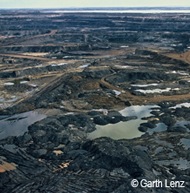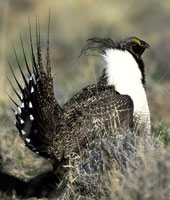
News |
- Russia Charges Greenpeace With Piracy
- Alberta Court Kills Government Block on Oilsands Hearing
- New IPCC Report Released Today
- Mass Civil Disobedience if Keystone XL Approved
- Wilderness Committee: Hudbay Reed Mine a Step Back
- Minnesota PUC: Review Enbridge Oil Pipeline Expansion
- Canadian Scientists Protest Government Censorship
- Endangered Sage Grouse: Protection By Emergency Order
- Ontario Director Of Pembina Institute Honoured
- Delay Keeyask Hearings: Fairness and Environment At Risk
- Wilderness Committee: Tanco Mine Disaster Risk
- Auditor General To Examine Pipeline Safety
| Russia Charges Greenpeace With Piracy | 10 October 13 |

Of the thirty Greenpeace activists taken into custody over their peaceful protest against arctic drilling by oil giant Gazprom, five of them on Wednesday have been officially charged with piracy by Russian officials. "A charge of piracy is being laid against men and women whose only crime is to be possessed of a conscience. This is an outrage and represents nothing less than an assault on the very principle of peaceful protest," said Greenpeace International executive director Kumi Naidoo. The activists from the ship are from 18 countries, including Australia, Brazil, Canada, Denmark, France, New Zealand, Russia, the UK and the US. Russian investigators said they had found drugs aboard a Greenpeace ship used in a protest against offshore Arctic drilling and would press new charges against some of the 30 people being held for alleged piracy. Greenpeace Russia mocked the accusation. "The Investigative Committee 'found' narcotics. We are waiting for it to find an atomic bomb and a striped elephant," it said on Twitter. "This is possible in Russia these days and can hardly surprise anybody." View October 10, 2013 CBC News articleView October 9, 2013 Reuters article View October 8, 2013 The Guardian article View October 8, 2013 RIA Novosti article View October 7, 2013 The Guardian article View October 6, 2013 Toronto Star article View October 6, 2013 The Globe and Mail article View October 2, 2013 Common Dreams article View September 24, 2013 BBC News Europe article |
|
 Print version Print version |
Top |
| Alberta Court Kills Government Block on Oilsands Hearing | 10 October 13 |

In a strongly worded ruling, Justice Marceau called the Alberta Government's actions "tainted" and concluded, "It is difficult to envision a more direct apprehension of bias," in the government's decision to improperly exclude the Pembina Institute's evidence and participation. "We are pleased to see that this error has been corrected," says Simon Dyer, policy director for the Pembina Institute. "Albertans have a right to a fair oilsands regulatory process including the right to be heard and raise concerns about oilsands development." The Pembina Institute filed a Statement of Concern with Alberta Environment and Sustainable Resource Development in 2012 to gain standing to express concerns about the second phase of Southern Pacific Resource Corp's proposed in situ oilsands project on the MacKay River near Fort McMurray. View October 4, 2013 Ernst v. EnCana Corporation articleView October 3, 2013 Edmonton Journal article View October 3, 2013 Calgary Herald article View October 2, 2013 Global News article View October 2, 2013 CBC News article View October 2, 2013 The Globe and Mail article View October 2, 2013 Pembina Institute media release View September 5, 2013 Pembina Institute media release |
|
 Print version Print version |
Top |
| New IPCC Report Released Today | 27 September 13 |

"This year in Canada, we experienced numerous extreme weather events, such as the floods in Calgary and Toronto," said David Suzuki Foundation science and policy manager Ian Bruce. "This shows how vulnerable our communities are if climate change is allowed to intensify. The IPCC report suggests that if we continue with business as usual in terms of rising carbon emissions, we will become even more vulnerable. But the report says we still have a choice; we can act to reverse the trend in emissions growth." The study, the fifth major assessment from the U.N. Intergovernmental Panel on Climate Change (IPCC), projects a bleak future of rising sea levels, more intense and frequent heat waves, destructive droughts and floods, as well as more acidic oceans that will be less capable of supporting marine life. View Climate Change 2013: The Physical Science BasisView September 27, 2013 Climate Central article View September 27, 2013 David Suzuki Foundation article View September 27, 2013 Elizabeth May press release View September 27, 2013 Pembina Institute media release View September 26, 2013 Democracy Now! article |
|
 Print version Print version |
Top |
| Mass Civil Disobedience if Keystone XL Approved | 27 September 13 |

In a tersely-worded letter signed by 350.org, Greenpeace, Friends of the Earth, NRDC, Sierra Club, and twenty other well-known green groups, the signers welcomed the idea of Canada finding new ways to reduce its growing rate of carbon pollution, but were direct in saying that making promises of future reductions the basis of a deal for the Keystone pipeline would ignite a serious backlash. "On behalf of our millions of members and supporters nationwide," reads the letter, "we oppose any deal-making in return for the Keystone XL tar sands pipeline. Our rationale is simple. Building Keystone XL will expand production in the tar sands, and that reality is not compatible with serious efforts to battle climate change." View September 26, 2013 Rabble.ca articleView September 24, 2013 letter to President Obama View September 24, 2013 The Washington Post article View September 24, 2013 Huffington Post article Sign the Keystone XL Pledge of Resistance |
|
 Print version Print version |
Top |
| Wilderness Committee: Hudbay Reed Mine a Step Back | 27 September 13 |

"It is hard news to take," said Eric Reder, Campaign Director for the Wilderness Committee. "Canada stopped mining national parks in 1930. Eight decades later and Manitoba still can't join the party?" The Hudbay's Reed Mine is located in Grass River Provincial Park in northwest Manitoba. Grass River Provincial Park is a provincial park, but99% of the 227,900-hectare park is not protected from development. The nearest large, protected park is over 200 kilometres away. "The Reed Lake mine proposed by Hudbay is within the unceded traditional territories of Mathias Colomb Cree Nation. This proposed mine raises serious concerns in relation to caribou populations, water quality, and carbon emissions. The province of Manitoba and the proponent, Hudbay, have failed to meet with MCCN, the true owners of these lands and resources, in good faith to obtain our free, informed and prior consent on any proposed activities within our territories." Chief Arlen Dumas of Mathias Colomb Cree Nation said when the mine project was announced in March 2013. View September 25, 2013 Wilderness Committee articleView April 5, 2013 CBC News article View March 7, 2013 Winnipeg Free Press article View March 5, 2013 Wilderness Committee article View January 9, 2012 The Northern Miner article View Manitoba Wildlands Provincial Parks Map Gallery View Public Registry File 5621.00 - Hudson Bay Mining and Smelting Co. Limited - Reed Mine |
|
 Print version Print version |
Top |
| Minnesota PUC: Review Enbridge Oil Pipeline Expansion | 27 September 13 |

Owned by Enbridge Energy Co. the line runs from Hardisty, Alberta, across northern Minnesota, and ends at an oil terminal in Superior, Wis. "I am concerned about the potential for disaster," said Harry Miller, a retired Lutheran clergyman from Eagan who was among the activists who sought an extended review of the project. Pipeline opponents led by MN350 asked the commission to force Enbridge to prove before an administrative law judge that the expansion is needed and would be safe. MN350, which says it's loosely affiliated with the climate change group, 350.org founded by environmentalist Bill McKibben questions the need for the expansion project, saying too much of the oil would be shipped out of state. McKibben and his group 350.org organize against TransCanada's proposed Keystone XL pipeline, which would import the same type of oil through western states. View September 8, 2013 Indigenous Environmental Network articleView September 4, 2013 Minnesota Public Radio article View September 6, 2013 PennEnergy article View September 3, 2013 StarTribune article |
|
 Print version Print version |
Top |
| Canadian Scientists Protest Government Censorship | 20 September 13 |

In Winnipeg, retired and working scientists, students and supporters issued an SOS — "Save Our Science" — call from the University of Winnipeg. Roughly 100 people attended a rally aimed to protest the Stephen Harper government's cutbacks to and cancellations of several scientific programs and the "erosion of science in Canada," said aquatic ecologist and Winnipegger Diane Orihel. "Scientists are generally apolitical and non-partisan, and don't really get involved in these types of demonstrations, so for scientists to actually step out of their labs and classrooms, and away from their science to be a voice for science, what it tells us is things are really bad," added Orihel, who has led the defence of the Experimental Lakes Area just over the Manitoba border in Ontario. Canadian scientists are also arguing that government cuts have reduced public science projects aimed at helping average Canadians in sectors like health and the environment. They're also upset about reports that the Conservative government has taken steps to restrict what scientists and other civil servants are allowed to say to the media. The Environmental Law Centre at the University of Victoria and the ethics advocacy group Democracy Watch has cited multiple examples of taxpayer-funded science being suppressed or limited to pre-packaged media lines across six different government departments and agencies. "Cuts to essential scientific programs and services have undermined our society's scientists' ability to serve the public good," said Gary Corbett, president of the Professional Institute of the Public Service of Canada. View September 17, 2013 Winnipeg Free Press articleView September 16, 2013 CBC News article View September 16, 2013 The Globe and Mail article View September 16, 2013 The Guardian article View September 16, 2013 Metro News article |
|
 Print version Print version |
Top |
| Endangered Sage Grouse: Protection By Emergency Order | 20 September 13 |

The Federal Court of Appeal says Ottawa can't use cabinet secrecy to hide decisions and debate about an endangered bird. The court says there may be an area in the dispute over sage grouse in which cabinet confidence may be invoked. Melissa Gorrie, lawyer for the environmental organization Ecojustice, said Wednesday the appeal court decision means the minister has to say whether a decision has been made. "It also makes it clear in the (Appeal Court) decision that if he's refusing to make a recommendation — so if his decision is not to recommend emergency protection — that decision is also reviewable by the court, that that can not be covered by cabinet confidence," Gorrie said The Greater Sage-Grouse lawsuit was filed by Ecojustice in early 2008 on behalf of the Alberta Wilderness Association, Federation of Alberta Naturalists, Grasslands Naturalists, Nature Saskatchewan and Wilderness Committee. The court decision offers hope the iconic sage-grouse, known for its spectacular mating dance, may recover from decimated numbers. An Emergency Order under the Species at Risk Act (SARA) can be used when a species faces imminent threats to its survival, and current protection measures are deemed inadequate. An Emergency Order for Greater Sage-Grouse would protect the habitat necessary for the survival of the species. This would be the first time this mechanism in the Act is being invoked. Environment Canada will issue an emergency order to protect an endangered species, a rare prairie bird called the greater sage grouse. Canadian Environment Minister Leona Aglukkaq announced September 17, 2013 that the emergency order will be issued in the coming months and will impose restrictions to protect the habitat of the sage grouse on provincial and federal lands in Alberta and Saskatchewan. View September 17, 2013 CBC News articleView September 17, 2013 Environment Canada news release View August 7, 2013 CBC News article View October 1, 2012 Ecojustice article View July 13, 2009 Ecojustice news release |
|
 Print version Print version |
Top |
| Ontario Director Of Pembina Institute Honoured | 20 September 13 |

"I'm very proud of the positive influence the Pembina Institute has had on transportation and urban development issues in recent years," said Burda. "Approximately one-third of all energy consumed in Canada is used to move people and goods. Greening our transportation sector is a key part of transitioning to a clean energy future." As Ontario Director of the Pembina Institute, Cherise Burda has become a leading voice in the debate around funding public transit in the Greater Toronto Area and a champion for location efficient development to "Live Where you Go"- with a goal of reducing greenhouse gas emissions and improving quality of life. View September 19, 2013 Pembina Institute media releaseView September 18, 2013 Ontario Government news release View Cherise Burda profile at Clean50 Visit Clean50 website View Pembina Institute Transportation page |
|
 Print version Print version |
Top |
| Delay Keeyask Hearings: Fairness and Environment At Risk | 13 September 13 |

Pimicikamak First Nation, Peguis First Nation, the Interfaith Task Force on Hydro Development and Manitoba Wildlands held a news conference Tuesday, September 10, 2013, to demand the CEC delay its public hearings on Manitoba Hydro's Keeyask generating station project on the lower Nelson River. The groups have filed motions filed with the CEC to secure a full Regional Cumulative Environmental Assessment (RCEA) of hydro-electric projects across Manitoba prior to any further hydro projects - exactly what the CEC outlined in its recent report on the Bipole III transmission line project. "A regional cumulative effects assessment is needed for all Manitoba Hydro projects and associated infrastructure in the Nelson River sub-watershed. The result of such an assessment would be a greater understanding of the impacts of the individual projects, as well as the cumulative impacts of all projects together." - From the CEC Report on Bipole 3. Gaile Whelan-Enns, Director of Manitoba Wildlands, commented; "The CEC is right. They were right in 2004, also. An independent cumulative effects assessment of our Hydro system is urgently needed." View September 12, 2013 Winnipeg Free Press articleView September 11, 2013 BASICS News article View September 10, 2013 Before It's News article View April 11, 2013 Manitoba Clean Environment Commission Pre-hearing transcript View November 17, 2012 Pembina Today article View February 28, 2012 Briarpatch Magazine article |
|
 Print version Print version |
Top |
| Wilderness Committee: Tanco Mine Disaster Risk | 13 September 13 |

The document explains that pillars supporting the roof of the mine have been mined to remove remnant ore, stating: "the mine reduced the pillar width from 15 m down to 7.5 m. This, in essence, reduced the strength of these pillars". TANCO has applied for environmental permits to dam and drain the lake above the mine, in order to relieve pressure on the pillars so they can continue mining. "Reading this report, I was shocked to see how risky and dangerous this situation has become," said Eric Reder, Campaign Director for the Wilderness Committee. In their Environment Act Proposal, TANCO says there are only two options - dam and drain Bernic Lake, sending water with elevated levels of heavy metals through the wetlands into the Bird River, or have Bernic Lake collapse into the mine and cause greater contamination to the lake. The Bird River flows into the Winnipeg River, and then into Lake Winnipeg. The Wilderness Committee is calling for the Manitoba government's Conservation and Water Stewardship branch to take over operations to mitigate this environmental catastrophe. View September 13, 2013 Wildnerness Committee articleView March 13, 2013 Winnipeg Sun article View TANCO company profile |
|
 Print version Print version |
Top |
| Auditor General To Examine Pipeline Safety | 13 September 13 |

"We will be auditing the government's monitoring systems to ensure compliance with Alberta's pipeline regulations. Our audit would include inspection and enforcement processes," wrote Saher. Jennifer Grant, director of the Pembina Institute's oilsands program, made the following comments in response to Auditor General Merwan Saher's commitment to undertake an audit of pipeline safety; "It's very positive to see the Auditor General committing to audit Alberta's pipeline monitoring systems and ensure they comply with regulations, and we applaud Mr. Saher for showing leadership on this important issue. This audit presents an opportunity to restore Albertans' confidence in the provincial regulator's ability to manage pipelines and the associated risks. We look forward to the results of this audit and welcome the Auditor General's recommendations to improve pipeline safety in the province." Canadian Natural Resources Ltd has four sites in Alberta, which have been leaking since Spring 2013. View September 13, 2013 Calgary Herald articleView September 12, 2013 Pembina Institute media release View September 12, 2013 Huffington Post article View September 12, 2013 Global News article |
|
 Print version Print version |
Top |


 RSS Feeds:
RSS Feeds: